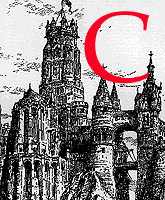 arlyle's intentions with this term remain unclear, but he probably alludes to the Capel family contemporary with Cromwell. Although Arthur Capel II, Earl of Essex, and Henry Capel, Baron Capel of Tewkesbury, did little to attract attention or deserve reknown, their father, first Baron Capel of Hadham, proved a significant supporter of Charles I. According to volume 3 of The Dictionary of National Biography, the king "had no adherent more faithful and devoted to the royal cause, nor any who made more splendid sacrifices, ending at last in his death on the scaffold . . . to the last Capel behaved with that magnanimity and heroism which had marked his whole career" (921). Safe to asssume then, that Carlyle genuinely approved of Arthur Capel and would not have used his name in a disparaging way.
arlyle's intentions with this term remain unclear, but he probably alludes to the Capel family contemporary with Cromwell. Although Arthur Capel II, Earl of Essex, and Henry Capel, Baron Capel of Tewkesbury, did little to attract attention or deserve reknown, their father, first Baron Capel of Hadham, proved a significant supporter of Charles I. According to volume 3 of The Dictionary of National Biography, the king "had no adherent more faithful and devoted to the royal cause, nor any who made more splendid sacrifices, ending at last in his death on the scaffold . . . to the last Capel behaved with that magnanimity and heroism which had marked his whole career" (921). Safe to asssume then, that Carlyle genuinely approved of Arthur Capel and would not have used his name in a disparaging way.
A further clue suggests that Carlyle refers to the actual man Capel, in his phrase "Capel Court", and that, moreover, he means the name to have positive connotations. In Two Notebooks of Thomas Carlyle reveals that from March 23, 1822 until May 16, 1832, Carlyle recorded thoughts and historical facts, particularly about Cromwell. Carlyle notes, for example: "Houses of Peers abolished soon after King's death. Poor Lord Capel's escape and recapture. Duke Hamilton, Lord Hamilton with him were beheaded" (17). His sympathy reveals his respect for Capel and leads one to believe that by placing "Capel Court" alongside "Heaven and Earth," Carlyle suggests some sort of connection between the terms; perhaps all three are in some way comparable.
Last modified 23 October 2002